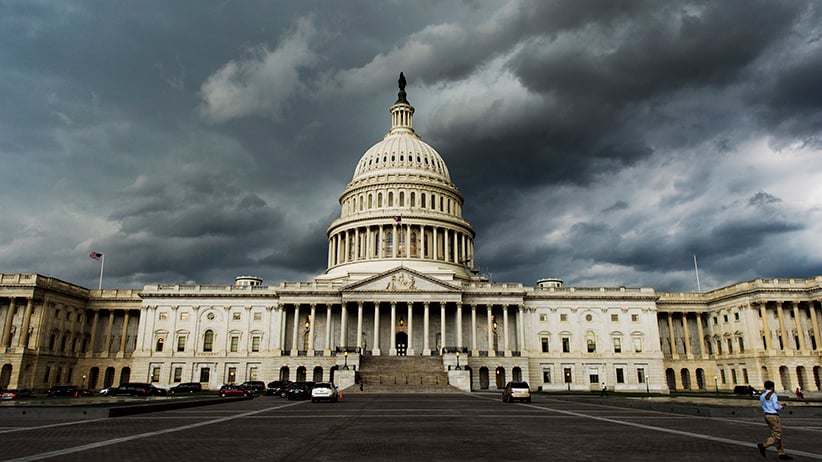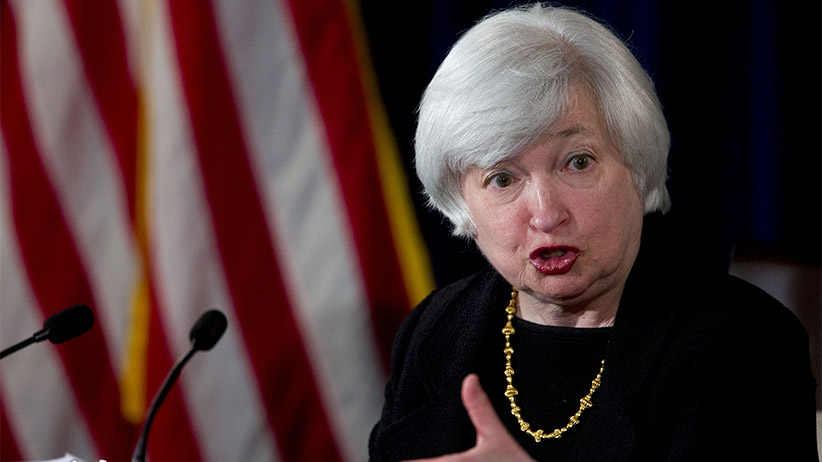In Washington, D.C., the political swamp monsters prowl on
Donald Trump vowed to ‘drain the swamp’. But in the black lagoon of the U.S. Capitol, America’s biggest career politicians press on uncertainly
A strong storm front passes over the U.S. Capitol on Tuesday, July 8, 2014. (Bill Clark/CQ Roll Call/Getty Images)
Share

Sen. Bernard Sanders of Vermont is striding down from the United States Capitol, looking as disgusted as ever. Waiting for him on a grassy knoll in the warm autumn sun are several hundred unionized schoolteachers, bus drivers, nurses and flight attendants, plus an assortment of activists who are anti-free trade, anti-oil, anti-big business, and anti- a lot of other things. Mostly they are anti-Donald Trump, vehement opponents of the president-elect billionaire who has vowed to “drain the swamp” that is Washington.
“Bernie! Bernie! Bernie!” the people chant at the approach of their 75-year-old youngblood. Many of them are holding up signs that read BERNIE 2020. The next presidential election is 1,447 days away. Why wait?
A member of the House of Representatives named Tulsi Gabbard, Democrat of Honolulu and an Iraq War veteran, is at the podium as the democratic socialist arrives.
“So many people think Washington does not feel the pain of their everyday challenges,” Gabbard, who was re-elected two weeks ago with 78 per cent of the vote in her district, is saying.
“Yes!” she pledges. “We do!”
Now Bernie Sanders takes the stage and promulgates precisely the opposite view—that official Washington, blinded by Clintonian (and similar) power-lust and avarice, has been mindless of the common man.
“The Democratic Party has got to recognize some very important realities that Donald Trump did recognize,” Sanders rasps to the aggrieved labourists. “There are millions of people today—working-class people, middle-class people—who are living in despair and we have got to recognize that reality.”
“Bernie! Bernie! Bernie!” shriek the inflamed hundreds.
“No—no, no. It’s not Bernie,” their idol demurs. “I appreciate your love and it’s mutual . . . but if there’s any message I have today it is not Bernie, it is all of us today.”
“Facts are facts,” he continues. “When you lose the White House to the least popular candidate in the history of America, when you lose the Senate, when you lose the House and when two-thirds of governors in this country are Republican, it is time for a new direction for the Democratic Party!”

On Election Day in New Hampshire, citizens who were unenamoured of the major-party nominees were permitted to blow off steam by writing in any name they chose. Bernie Sanders received 4,493 such futile votes. Among the biggest losers of 2016, Jeb Bush, got 230 votes and New Jersey Gov. Chris Christie registered 23, which was 35 fewer than the purposely ridiculous Vermin Love Supreme, a quadrennial “Candidate for Overlord of Planet Earth” who promised every American a free pony.
Now, in Washington, it is starting all over again: the straight-faced post-truthiness, the horn-honking gridlock, the partisan deafness, the phony filibustering under the shimmering Capitol dome, freshly painted just in time for Trump’s inaugural address, now eight weeks away. Nine weeks after that, the U.S. government will run out of money. In the meantime, a stream of candidates for top administration jobs— among them Mitt Romney, whom Trump once labelled “a choker” and who once called Trump “a fraud”—have been paraded before cameras as they head to meet Trump at his New York tower or New Jersey golf club.
In the crowd at the pro-Bernie, anti-Trump rally, draped in saffron, is a Buddhist from Maryland who calls herself Ani (“Sister”) Sangye.
“Do you think that president Trump will be able to drain the swamp?” she is asked.
“He’s filled it with even greater swamp monsters,” she replies. “To me, ‘drain the swamp’ means getting rid of the corporate lobbyists. I don’t know what it means to Trump. I don’t think he even knows what it means.”
Sangye says that she disagrees with Hillary Clinton’s calculation that half of the passengers on the Trump train were “a basket of deplorables.” (Those four words may well have cost Clinton the presidency.)
“It’s a lot more than half,” the ascetic asserts. “I’ve had death threats. There have been attacks on me as a Buddhist, as a nun and as a woman. I can handle a loss. But not this loss.”
A man from Massachusetts named Robert Kopper stands nearby. “I don’t think all the demonstrations against Trump are really working,” Kopper understates.
Back up the hill trudge the senator from Vermont and the congresswoman from Hawaii.
In an auditorium underneath the Capitol Visitor Center, Nancy Pelosi is holding forth. She is the current Democratic Party leader in the House of Representatives and the chamber’s former Speaker. Under Pelosi’s stewardship, the Democrats failed to win a majority of seats in 2010, 2012, 2014 and 2016.
For this debacle, Pelosi volunteers to accept no blame. “We cannot be taking full responsibility for the election,” she says. “There were a lot of factors beyond our control. The American people need to know that a foreign power played a role in our election.”
And: “The problem was more with the communication than with our policies. We didn’t message it so that they understood. It’s not about me, it’s about them.”
In a nearby room, Tim Ryan, Democrat of Ohio, is announcing his candidacy to replace Pelosi at the head of the Democratic delegation. This vote will be held at the end of November. Ryan has declared that “the definition of insanity is to do the same thing over and over again and keep getting the same results.”
Pelosi has been in the House since 1987. She is one of the wealthiest politicians on the Hill and shows no signs of surrendering to Ryan of Ohio, a babe-in-the-woods who has festered in the miasma only since 2003. “In 2018,” Pelosi says, “we have an opportunity . . . this is not a guarantee . . .”
The Democratic leader leaves the room and Republican Paul Ryan, the current Speaker and Romney’s running mate in 2012, replaces her. (Ryan of Wisconsin is not related to Ryan of Ohio.) Speaker Ryan is a busy man, untangling the knots he twisted himself into while he endorsed and then un-endorsed and then un-un-endorsed Trump even as he called Trump a racist.
Paul Ryan has been in Congress since 1999. He blames the Obama administration for the Capitol’s swampy state of affairs—particularly the President’s moves to circumvent Congress by issuing orders to be carried through by his own appointees. “When we say ‘drain the swamp,’ ” says Speaker Ryan, “we mean that we have to stop giving all this power to unelected bureaucrats to run our lives.”

In a Capitol Hill office building this day, a panel of senators and representatives is interrogating Janet Yellen, the chair of the board of governors of the Federal Reserve System. One of the grillers is Rep. Carolyn Maloney of New York, who has been in Congress since 1993. She notes smugly that Trump’s promised swamp-draining “may have countervailing effects.” For example: “He has stated both that the current low interest rates are good for the economy and that the Fed was playing politics by keeping them at these levels.”
“Can you envision not serving out your term?” Maloney asks Yellen.
“No,” comes the rejoinder. “I cannot.”
Yellen, Maloney, Ryan, Ryan, Pelosi, Sanders. Deep in the black lagoon, the creatures briefly stir, then settle back into the silt.
And now: striding toward an elevator on the Senate side of the United States Capitol comes John McCain, elected two weeks ago to his sixth six-year term at the age of 80. He has been a member of Congress since 1983.
“What do the words ‘drain the swamp’ mean to you?” McCain is asked.
“Change the environment of what is perceived to be corruption and failure to respond to the wishes of the American people,” he answers.
“Is it drainable?” a reporter persists.
“I don’t know,” says McCain. “I hope so, but I don’t know.”